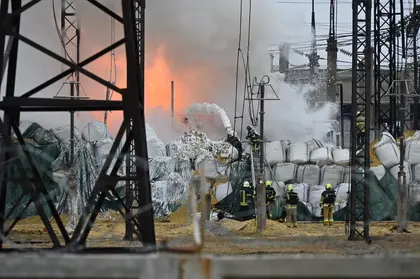A Russian missile attack has left Ukraine's second largest city, Kharkiv, completely without electricity and heating, according to Mayor Igor Terekhov on Friday.
This follows Ukraine's earlier statement on Russia launching its largest aerial assault in months, targeting energy facilities across Ukraine and resulting in at least five fatalities.
JOIN US ON TELEGRAM
Follow our coverage of the war on the @Kyivpost_official.
“The city is completely without power, affecting water and heating supplies,” Terekhov stated in a video on social media.
“Utilities and power engineers require time to address the challenges posed by this hostile shelling... I urge everyone to remain calm and patient,” he added in a post.
On the evening of Friday, March 22, Oleg Synegubov, head of the regional military administration (OVA), reported that energy workers in Kharkiv maintained critical infrastructure and ensured the functioning of essential facilities.
"The next focus is on household consumers," he wrote.
Synegubov mentioned the overall challenging situation, indicating that specialists will work tirelessly to restore electricity supply promptly.
"At this point, we will refrain from disclosing specific timelines to prevent the enemy from learning our plans," the OVA head wrote.
Additionally, various regions across Ukraine reported blackouts, with at least 200,000 affected in the western Khmelnytsky region and approximately 260,000 in the southern Odesa region.

EXPLAINED: What We Know About Russia’s Oreshnik Missile Fired on Ukraine
The press service of the Prosecutor General's Office reported “significant damage” in Zaporizhzhia, with the Dnipro hydroelectric plant alone struck eight times.
Ukrenergo's dispatch center ordered the lifting of energy supply restrictions to household consumers across Ukraine, except for the Kharkiv, Dnipropetrovsk, Khmelnytsky, and Odesa regions.
During the marathon broadcast, DTEK's executive director, Dmytro Sakharuk, reported that the attacked generation facilities on March 22 are currently inactive due to extensive damage. Power engineers are assessing the damage at power plants in preparation for restoration efforts.
You can also highlight the text and press Ctrl + Enter






